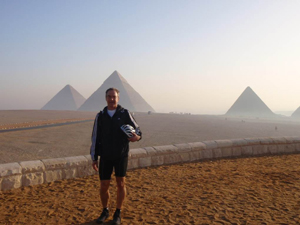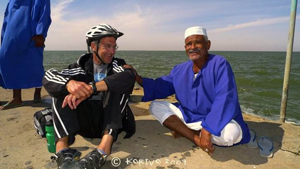Source: Crop Science Society of America
By Danielle St. Louis
Paul Porter likes to bicycle. He also likes to explore different teaching methods. So for three semesters, Porter, a professor in the College of Food, Agricultural, and Natural Resource Sciences at the University of Minnesota, paired these two interests. Porter rode a bicycle across Africa and South America while teaching students about issues like using plants for food and fuel, managing water, and the changing climate.

Paul Porter at the start of the Tour d’Afrique on the outskirts of Cairo, Egypt in January 2009. Photo provided by Paul Porter.
Porter's classes focused on international food systems. But classes weren't a series of lectures based on readings from textbooks. Students interacted remotely with Porter as he rode his bicycle across two continents. This unique approach to teaching combined adventure learning (AL) and systems action education (SAE).
Adventure learning lets students experience real-world issues in an authentic way. An adventurer serves as the students' guide, who then communicates with students using online technologies. SAE asks students to consider individual elements in a system and how all of the elements connect.
Porter believes these two teaching methods work well together and are a good fit for studying the relationships of living organisms to each other and their surroundings in the context of farming. "This sort of course enables students to be intimately exposed to real-world situations without the expense of travel," Porter explained.
Students might not be able afford to travel to Sudan or Peru. However, they could experience these places with Porter by bike at 10 miles per hour. "Bicycling is a great way to see the countryside and to experience what is happening 'on the ground'... the pace can allow one to begin to get a feel for the climate and cultures one is experiencing," Porter said.

Paul Porter and a Sudanese man on the shores of Lake Nassar. Photo provided by Paul Porter.
Porter used audio blogs, photos, videos, written blogs, and live conversations to include the students in his adventure. Porter thinks the different foods, languages, and cultures stuck with students. Many expressed an interest in international travel after taking the course.
Students felt like they were on the adventure as well. "One evening in a desert in northern Kenya I connected live with students shortly after a drenching downpour. I suspected they could hear the fatigue and frustration in my voice as I wondered how I would get my gear dry, sleep, and be able to bike on the muddy path the next morning."
Using methods like AL and SAE can be challenging. They depend heavily on the use of online technologies, which can be unreliable. Porter and his co-teachers back in the States tried to find the best technologies for teaching the class. This often meant students had to learn new tools. But even these challenges are part of what makes this teaching method authentic. Porter stresses, "The ability of being a life-long learner can't be emphasized enough."
Porter continues to try out alternative teaching methods and different technologies. No matter the issue being studied or the tool being used, his goal is always the same. He wants to help students gain a greater understanding of the issues by incorporating “real-life experiences and challenges of common farming folks in their struggle with us toward a sustainable future.”
Click here to read more about Porter and his colleagues’ experiences in Natural Science Education.